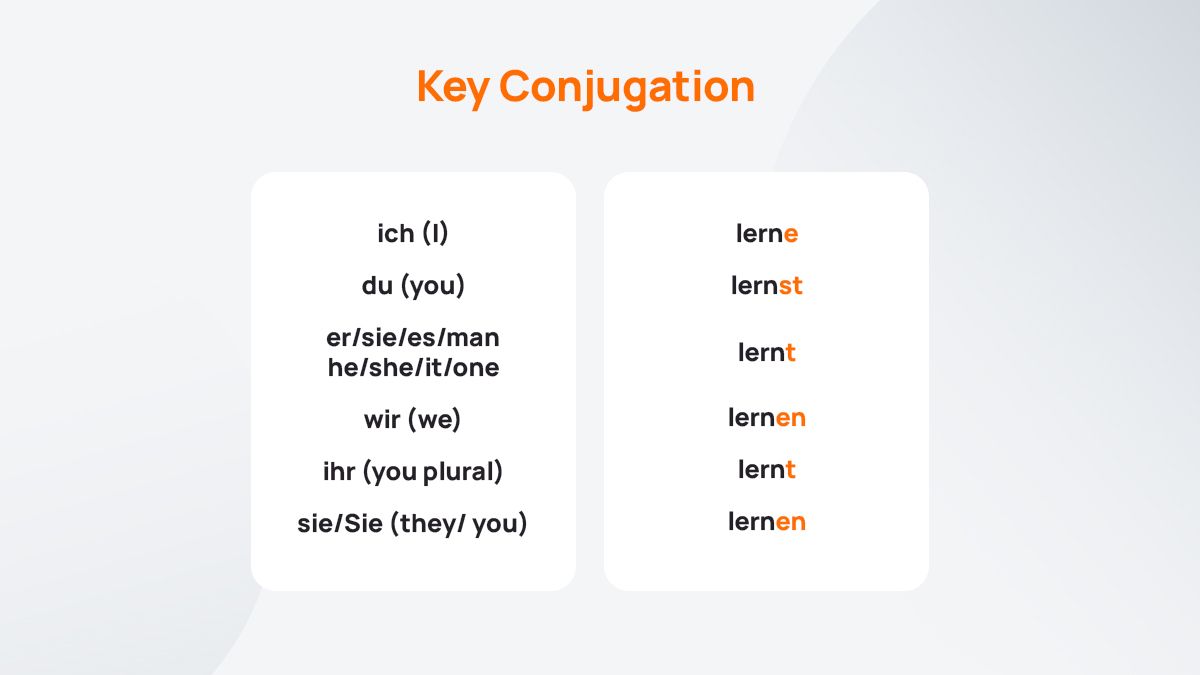A Guide to German Verbs for Beginners

German verbs has six tenses:
- present (Präsens)
- present perfect (Perfekt)
- simple past (Präteritum)
- past perfect (Plusquamperfekt)
- future (Futur I)
- future perfect (Futur II)In this post, we address the six tenses in German, the basics of conjugation, and the most common German verbs. Hopefully, by the end of this German verb guide, you will feel inspired to kick-start your language learning journey and begin to learn German.
The hardest part of any task is getting started, but with our simple explanations, tips, and examples, you can sink your teeth into a new language with confidence and learn to speak German.
Feel free to peruse our German verbs list, which will teach you 50 of the most useful and common German verbs, and start to get a feel for the language.
Verb Tenses in German
Before you can begin to understand German verbs, you need to understand tenses and conjugation.
Depending on when the action took place and who did it, the verb will have a different ending.
This is known as conjugation; when you take the infinitive verb and change the ending to indicate the person and time an action was taken.
Conjugation
In German, the infinitive verbs are those with -en endings, while in English, they have “to” before them. For example, we have “to kick” (treten) and “to run” (laufen).
So, in English, we conjugate “to run” in present tense third person singular as “he runs”, while in German laufen becomes er läuft.
The Present Tense (Präsens)
This is the first tense that you will learn in German and it is used to talk about what you are doing right now, what you regularly or always do, something ongoing, and the near future.
Once you have grasped the present tense, you will already be able to express a lot about yourself, your routine, and your upcoming plans.
As with other tenses, the present tense conjugation depends upon the verb stem. For now, however, we will just focus on the tenses, their uses, and a couple of examples.
- Ich lerne Deutsch = I am learning German
- Er hat einen Hund = he has a dog
- Sie kommen nicht – They aren’t coming
The last sentence is an example of the present tense being used to talk about something in the near future.
The Present Perfect Tense (Perfekt)
The Perfekt tense is used in German to discuss events that occurred in the recent past (minutes, hours, days, weeks, or months ago), or when you are addressing someone informally. This can be either verbally or in writing, such as in an email.
In order to conjugate verbs in the perfect tense we use the present tense form of the verb sein (to be) or haben (to have) and the past participle. Haben or sein will act as the auxiliary verb, or helping verb, to form the perfect tense.
The past participle is the form of a verb that indicates a completed action.
In English, these end in –d, -ed, or -t, like “kicked” or “slept“. In English, as with German, there are irregular verbs to look out for.
In order to form the past participle in German verbs that are regular, add ge– to the beginning of the verb stem and –t to the end.
For irregular verbs, you add ge– to the beginning of the verb stem and -en to the end.
For example:
- Wir sind nach Amerika gefahren = We went to America
- Ich habe ihm meine Nummer gegeben = I gave him my phone number
- Du hast das ganze Essen gegessen – You have eaten all the food
The Simple Past Tense (Präteritum)
The simple past tense, otherwise known as the Präteritum, or preterite tense in English, is used for any event dating further back in the past (years, decades, and centuries ago).
You can also use it when addressing someone formally.
However, please note that many native German speakers do not always follow these grammar rules and can be heard mixing the Perfekt and Präteritum past tenses indiscriminately.
For example:
- Mozart zog 1781 nach Wien um – Mozart moved to Vienna in 1781
-
Big Ben wurde 1859 fertiggestellt – Big Ben was completed in 1859
The Past Perfect Tense (Plusquamperfekt)
The Plusquamperfekt, or pluperfect tense, also known as the past perfect tense, describes an action that took place before another action in the past.
The past perfect tense in German is formed just like the present perfect tense, except the auxiliary (again, either haben or sein) is in its simple past tense form.
Which auxiliary you use depends on the verb that follows (again, in past participle form).
For example:
- Der Wolf hatte die Großmutter schon gefressen, als Rotkäppchen ins Haus kam = The wolf had already eaten the grandmother before Little Red Riding-Hood came into the house
- Wir hatten gut gespielt, bis sie verletzt wurde – We had played well until she was injured
The Future Tense (Futur I)
The future tense in German is just like in English when we say “I/you/he/she/it/we/they will…” to talk about a future event.
This is a super easy tense to learn because it only requires you to know the conjugation of werden (will) and then add on an infinitive verb.
For example:
- Wir werden versuchen, langsamer zu essen – We will try to eat more slowly
- Ich werde Ihnen die Antwort sagen – I will tell you the answer
- Gebt und ihr werdet wiederum empfangen = Give, and you will in turn receive
The Future Perfect Tense (Futur II)
Finally, we have the future perfect tense. This, like the other perfect tenses, requires a past participle.
To form the future perfect in German, we use werden + past participle + haben/sein.
Again, this is similar to the English “will have”. The only difference is that, as always in German, the non-conjugated verb moves to the end of the clause:
For example:
- Wenn ihr ankommt werden wir ein Hotel gefunden haben = By the time you arrive, we will have found a hotel
- Bis heute Abend werden wir das Geschirr gespült haben = By this evening, we will have done the dishes
Key Conjugation rules to remember in German
Now that you know what verbs are and how the tenses work in German, let’s look at conjugating a regular (or weak) verb in the present tense.
First, the German pronouns are as follows:
- ich (I),
- du (you)
- er/sie/es/man
- he/she/it/one
- wir (we)
- ihr (you plural)
- sie/Sie (they/ you)
Next, you need to know if the verb you want to use is strong or weak, in German terms, otherwise referred to as regular or irregular.
Weak, or regular verbs, are those which follow a conjugation pattern. This means you can learn a set of verb endings and apply them to all regular verbs.
We conjugate verbs by removing the -en ending and adding a new ending.
Strong verbs, also known as irregular verbs, do not follow the usual pattern, so they need to be learned individually.
Conjugating Lernen – to learn
So, using lernen as an example of a weak, or regular verb, we first remove the -en ending to get the verb stem lern-.
Then, we add our regular verb endings, -e, -st, -t, -en, -t, -en.
- ich lerne
- du lernst
- er/sie/es lernt
- wir lernen
- ihr lernt
- sie lernen
Pretty easy, right? Richtig, das ist einfach!

Other Types of German Verbs
Irregular verbs
Strong verbs take on irregular conjugated forms, meaning they do not follow the regular pattern.
Unfortunately, there are some very important and common verbs in German that are irregular.
We will provide an example later on.
Inseparable prefixes
Verbs whose initial syllable is never detached from the verb root in any tense or conjugated form is known as an inseparable prefix verb.
These are always unstressed syllables, meaning you do not emphasize this part of the word when it is said aloud.
They are almost always small groups of letters that form a specific meaning. For example, the English prefixes “pre-” (before) or “dis-” (not/none).
Prefixes that are always inseparable are -be, -emp, -ent, -er, -ge, -miss, -ver, -zer.
Examples include:
- bezaubern (to enchant)
- empfehlen (to recommend)
- entfliehen (to flee from)
- erneuern (to renew)
- gefallen (to be pleasing)
- missfallen(to displease)
- verhungern (to starve)
- zerstören (to destroy)
reflexive verbs
A reflexive verb is a verb whose direct object is the same as its subject. Or, more plainly, it is when the speaker is doing the action to themselves.
For example:
- ich wasche mich = I wash myself
You can spot a reflexive German verb by its use of “sich” (self) in the infinitive form.
- sich ärgern – get angry
- sich freuento – be happy
- sich hinlegento – lie down
These verbs are conjugated by changing the sich to suit the person doing the action. Then, add the appropriate verb endings. Don’t worry, you do not need to worry about that today!
modal verbs
A modal verb is a type of verb that contextually indicates likelihood, ability, permission, request, capacity, suggestion, order, obligation, or advice.
This might sound like a lot to take in. Luckily, in German, there are only 6 of these words to learn.
The 6 modal verbs in German are:
- können – can
- dürfen – may
- mögen – like
- müssen – must
- sollen – should
- wollen – want
Aside from specific idiomatic expressions, each of these words has a distinct meaning.
The Most Common German Verbs
So far, you have learned the basics of German verbs and tenses, including the definitions of the infinitive, auxiliary and past participles, and different kinds of verbs.
Moreover, you know that German verbs are conjugated to express the time of the action and who took it.
Now, you are ready to start learning some common and useful German verbs.
On top of this, you will learn the conjugation of sein, the most important German verb of all, in the present tense.
Mögen – to like.
This is not only one of the most common words in German, but it is very useful for expressing yourself, your likes (and dislikes), and wishes for the future.
- Ich mag…/ Ich mag nicht… – I like/ I don’t like…
- Ich mag Fußball spielen – I like to play soccer
- Ich mag es nicht, wenn du das tust – I don’t like it when you do that
- Wir möchten ein Kind adoptieren – We would like to adopt a child
Können – to be able to
With the ability to conjugate this German verb and the knowledge of a few good infinitive verbs, you can already express so much.
- Ich kann… / Ich kann nicht… – I can/ I cannot…
- Ich kann nicht flirten – I can not flirt
- Wir können tanzen – we can dance
- Ihr könnt Deutsch lernen – they can learn German
Haben – to have
As you have seen, this verb is not only very common and useful but vital for the formation of certain tenses, just as in English.
Whether you are using the verb “to have” for its meaning or its use as an auxiliary, you will need to get comfortable with the conjugation and spotting how the word is being used in a sentence.
- Wir haben die Katze verloren – we have lost the cat (auxiliary)
- Ich habe langes Haar – I have long hair (literal meaning)
- Ich habe nicht geschlafen – I have not slept (auxiliary)
- Ihr habt viel zu tun – you have a lot to do (literal meaning)
- Sie haben die Tür offen gelassen – they have left the door open (auxiliary)
Getting the hang of it?
English speakers have the advantage here of being able to compare the use of “have” in these sentences to their English translations.
You will notice it works the same way.
The Verb Sein: The Most Important German Verb
Pronoun Conjugation: Translation in English
- ich bin – I am
- du bist – you (singular, informal) are
- er/sie/es/man ist – he/she/it/ one is
- wir sind – we are
- ihr seid – you (plural, informal) are
- Sie sind – they/you (formal) are
If you are new to learning a foreign language, you may never have seen verb tables before. Do not be overwhelmed, it is more straightforward than it might look.
Essentially, the first words which are not highlighted are the German pronouns.
The second words, which are highlighted, are the verbs in their conjugated forms in the present tense and matching the corresponding pronoun.
For example, the first line has ich, which means “I” and bin, “am”. An example of this conjugation in a sentence is:
- Ich bin größer als mein Vater – I am taller than my father
Sein is a strong verb, or in other words, it is one of the many German irregular verbs that you need to be aware of.
This means that it does not follow the regular verbs in their conjugation pattern, as shown above.
Remember, verbs that take sein in the present tense will also take it as the auxiliary in the past perfect tense.
For example:
- ich war gereist – I had traveled
FAQs about German Verbs: What we all need to know
How many verbs are there in German?
There are many hundreds of verbs in German.
While we cannot cover them all here, you can learn them in a natural context by taking in German media, for example, films and TV.
Lingopie is a great tool for learning German verbs in a natural context by streaming shows and movies online. If this interests you, check out our list of the top 20 German movies and series to learn the German language.
We also have a list of the top 10 German shows on Netflix to make it even easier for you to practice the language.
Moreover, you should take advantage of podcasts, news sites, and music in German for practice and exposure.
Top 100 German Verbs
What are all the verbs in German?
Here is a list of 50 of the most common German verbs and their meanings:
- haben – have
- sein – be
- können – be able/can
- lessen – read
- mögen – like
- werden – become
- sagen – say/ tell
- müssen – have to/must
- geben – give
- wollen – want
- machen – make
- kommen – come
- sehen – see
- fahren – drive
- sprechen – speak
- sollen — shall/ to be supposed to
- gehen – go/ walk
- heißen — be called
- wissen – know
- finden – find
- bleiben – stay
- dürfen – allowed to
- lassen – let/ allow/ have done
- stehen – stand
- liegen – lie
- denken – think
- nehmen – take
- tun – do
- glauben – believe
- halten – stop/ hold
- nennen – name/ call (a name)
- zeigen – show
- führen – lead
- bringen – bring/ take
- leben – live
- meinen – think/ have an opinion
- fragen – ask
- gelten – be valid
- stellen – place/ set
- spielen – play
- arbeiten – work
- brauchen – need
- folgen – follow
- lernen – learn
- bestehen – exist/ insist/ pass (an exam)
- verstehen – understand
- setzen – set/ put/ place
- bekommen – get/ receive
- beginnen – begin
- treffen – meet
Summing up: A Guide to German Verbs for Beginners
This has been a guide to learning German verbs, tenses, and conjugation for beginners.
We have covered regular and irregular verbs, prefixes, reflexive and modal verbs, and some of the most useful and common verbs in German.
If you have enjoyed learning German verb rules and interesting words, this is your gentle nudge to carry on learning German!
And to help you even further, we’ve put together this great beginner’s guide to learning German where you’ll find amazing tips.
If you want to learn to speak German, you can check out German app.
Start to learn German today, and viel Glück, or good luck!




























